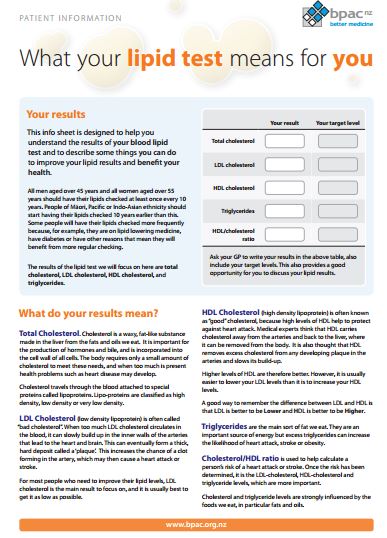Triglycerides
Key points about triglycerides
- Triglycerides are a type of fat found in your blood that are used to provide energy for your body.
- Most of the fats you eat are triglycerides.
- If you regularly consume more energy than you need, you can get high triglyceride levels.
- You can't tell or feel if your triglyceride level is high, a blood test is needed to find out.
- High triglyceride levels (usually a level above 1.7 mmol/L) increase your risk of heart attack, stroke, and heart disease.
- Healthy lifestyle measures can help lower them. Some people may also need to take medicines.

Triglycerides are a type of fat in your blood that is an important form of energy for your body. Most fats you eat contain triglycerides. If your body doesn't need the energy right away it's stored for later.
These triglycerides are stored in fat cells around your body, commonly on your hips and belly. If you need energy between meals, triglycerides are released into your blood from these fat cells.
If you regularly consume more energy than you need, you can get high triglyceride levels.
Triglycerides and cholesterol are both fats that circulate in your blood. They both have essential roles in your body:
- Triglycerides store unused calories and provide your body with energy.
- Cholesterol is used to build cells and certain hormones.
Too much of either can increase your risk of heart disease. A blood test measures your triglycerides along with your cholesterol. Read more about cholesterol.
Having a high level of triglycerides in your blood doesn’t usually have any symptoms. The only way to find out if your triglycerides are high is to have a blood test called a lipid profile or lipid panel. This test measures the amount of cholesterol (another type of fat) and triglyceride levels in your blood.
High triglyceride levels are common in people with diabetes, as well as those who are obese or who drink a lot of alcohol.
The ideal level of triglycerides in your blood is below 1.7 mmol/L, but this level is not a strict target for everyone. Your triglyceride level is looked at together with other test results and factors (eg, your weight and smoking status) to gather an overall picture of your health. Your healthcare provider will discuss your results with you.
High triglyceride levels are of concern as they increase your risk of heart attack, stroke and heart disease. Your triglyceride level is used, along with other factors, to calculate your cardiovascular risk (your risk of having a heart attack or stroke in the next 5 years). Read more about cardiovascular risk assessment.
Very high triglycerides can cause an inflamed pancreas (called pancreatitis), which can be very serious and even life threatening.
- Being overweight or obese.
- Lack of physical activity.
- Excessive alcohol use – alcohol is high in calories and sugar. Even small amounts of alcohol can raise triglyceride levels.
- Certain diseases and medicines.
- Some genetic disorders.
- Smoking – increases your risk of heart disease and stroke by increasing clotting factors in the blood, decreasing HDL (good) cholesterol levels, increasing triglyceride levels, and damaging the lining of blood vessels.
You may be able to lower your triglycerides by having a healthy lifestyle which is a combination of keeping a healthy weight (by limiting your salt and alcohol intake, and eating well) and physical activity.
- If you're overweight, losing weight will help lower your triglyceride level and your risk of heart problems. A good starting goal is to aim to lose 5 to 10% of your bodyweight.
- Stop smoking: There are huge health and financial benefits to quitting smoking. Some of these will be felt straight away.
- Ideally, you should be active for at least 30 minutes on most or all days of the week. Physical activity lowers triglycerides and boosts health-healthy HDL cholesterol.
- Eating well can improve your triglyceride levels in a short time, even within 1 or 2 weeks. It helps to know how much fat is in the foods you buy from the supermarket, read more about how to understand nutrition information panels (food labels). You can also find more information about how to reduce foods that raise your triglyceride levels and what to replace them with(external link).
- Omega-3 fish oils can help to lower your triglyceride levels if you're not already taking a statin.
- A dietitian can give you advice on what to eat and drink to lower your triglyceride levels, you can ask your healthcare provider for a referral.
Read more about swapping out foods for something healthier, stopping smoking and increasing your physical activity.

Image credit: Canva
Medicines
You may also need to take medicines to lower your triglycerides. Your healthcare provider will let you know if you need to take medicine and may start you on a statin(external link), bezafibrate(external link) or acipimox. Although you won’t feel any different when you take these medicines, it's important to keep taking them regularly to lower your chance of heart problems.
Simple Steps to Healthier Eating(external link) Heart Foundation, NZ (also available in te reo Māori(external link), Hindi(external link) and Chinese(external link))
Cholesterol – what your lipid test means for you(external link) BPAC, NZ
Dietary advice for management of high triglycerides(external link) NHS, UK
Brochures
Eating for a healthy heart(external link) Heart Foundation, NZ, 2023
Apps/tools
Diabetes apps
Heart age forecast(external link)
References
- Cardiovascular disease risk assessment and management for primary care(external link) Ministry of Health, NZ, 2018
- New Zealand primary care handbook(external link) Te Whatu Ora, NZ, 2012
- Prescribing statins to reduce cardiovascular risk(external link) BPAC, NZ, 2021
- Triglycerides(external link) Better Health Victoria, Australia
- High blood triglycerides(external link) National Heart, Lung, and Blood Institute, US, 2023
- van der Plas A, Antunes M, Pouly S, et al. Meta-analysis of the effects of smoking and smoking cessation on triglyceride levels(external link) Toxicol Rep 2023;10:367-375.
Cardiovascular disease risk assessment and management for primary care(external link) Manatū Hauora, NZ, 2018
Cardiovascular disease – risk assessment and reduction, including lipid modification(external link) NICE, UK, 2023
Prescribing statins to reduce cardiovascular risk(external link), BPAC, NZ, 2021
Apps
Brochures

BPAC, NZ, 2012

Heart Foundation, NZ, 2023
Credits: Healthify editorial team. Healthify is brought to you by Health Navigator Charitable Trust.
Reviewed by: Claire Salter, Pharmacist, Tauranga
Last reviewed:





